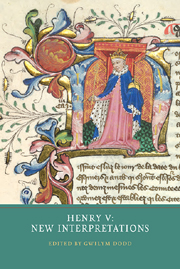Book contents
- Frontmatter
- Dedication
- Contents
- Preface and Acknowledgements
- List of Contributors
- Abbreviations
- Introduction
- 1 The Making of a Prince: The Finances of ‘the young lord Henry’, 1386–1400
- 2 Henry V's Establishment: Service, Loyalty and Reward in 1413
- 3 Henry V, Lancastrian Kingship and the Far North of England
- 4 Henry V's Suppression of the Oldcastle Revolt
- 5 Religion, Court Culture and Propaganda: The Chapel Royal in the Reign of Henry V
- 6 ‘Par le special commandement du roy’. Jewels and Plate Pledged for the Agincourt Expedition
- 7 Henry V and the Cheshire Tax Revolt of 1416
- 8 Henry V and the English Taxpayer
- 9 Henry V, Flower of Chivalry
- 10 War, Government and Commerce: The Towns of Lancastrian France under Henry V's Rule, 1417–22
- 11 Writing History in the Eighteenth Century: Thomas Goodwin's The History of the Reign of Henry the Fifth (1704)
- Index
- York Medieval Press: Publications
Introduction
Published online by Cambridge University Press: 05 July 2013
- Frontmatter
- Dedication
- Contents
- Preface and Acknowledgements
- List of Contributors
- Abbreviations
- Introduction
- 1 The Making of a Prince: The Finances of ‘the young lord Henry’, 1386–1400
- 2 Henry V's Establishment: Service, Loyalty and Reward in 1413
- 3 Henry V, Lancastrian Kingship and the Far North of England
- 4 Henry V's Suppression of the Oldcastle Revolt
- 5 Religion, Court Culture and Propaganda: The Chapel Royal in the Reign of Henry V
- 6 ‘Par le special commandement du roy’. Jewels and Plate Pledged for the Agincourt Expedition
- 7 Henry V and the Cheshire Tax Revolt of 1416
- 8 Henry V and the English Taxpayer
- 9 Henry V, Flower of Chivalry
- 10 War, Government and Commerce: The Towns of Lancastrian France under Henry V's Rule, 1417–22
- 11 Writing History in the Eighteenth Century: Thomas Goodwin's The History of the Reign of Henry the Fifth (1704)
- Index
- York Medieval Press: Publications
Summary
Recent years have seen considerable advances made in the study of the reign of Henry V, and, consequently, in our understanding and appreciation of the man himself. If the events of the year 1415, which witnessed the king's first foray into France ending with the victory won at Agincourt, still claim headline status, there is a greater eagerness to view the ‘real’ Henry rather than a ‘creation’ of the historical past. Modern historical scholarship demands a more rounded, a more considered, certainly a more complex assessment of him. A better understanding of the king, his times, his policies and his achievements – never an easy task for a single scholar to attempt – can be gained through the shorter contributions offered by individual scholars. The chapters which follow, most of which were originally presented as papers at a small colloquium organized by the editor at the University of Nottingham in July 2011, should be seen as contributions towards a better appreciation of the career and rule of a remarkable king.
Henry's life may be divided into three broadly equal phases: from birth (in 1386) to becoming Prince of Wales (1399); as Prince of Wales (1399–1413); and, finally, as king of England (1413–22). It is important, therefore, that historians should not forget the first two ‘thirds’ of Henry's life, which made him twenty-six years old when he inherited the throne from his father, Henry IV.
- Type
- Chapter
- Information
- Henry VNew Interpretations, pp. 1 - 10Publisher: Boydell & BrewerPrint publication year: 2013



